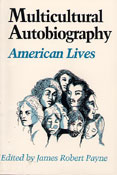Multicultural Autobiography
American Lives

- Author(s): Payne, James Robert
- Series:
- Imprint: Univ Tennessee Press
- Publication Date: 1992-07-30
- Status: Active
- Available in Hardcover - Cloth: Price $41.00 | Buy Now
Building on concepts developed by the Reconstructing American Literature Project Institute at Yale University, Multicultural Autobiography is the first book to focus completely on the actual multicultural character of American self-writing. Here, eleven contributors, each fluent in a particular tradition of American autobiography, offer thorough essays on significant, though often neglected, areas of American personal history and suggest directions for future inquiry.
Focusing on John Joseph Mathew’s bicultural narrative Talking to the Moon, A. LaVonne Brown Ruoff presents an opening chapter on American Indian autobiography. In chapters exploring key aspects of African-American autobiography, Frances Smith Foster considers Elizabeth Keckley’s Behind the Scenes as an exemplary text of post–Civil War black personal narrative, and Keith Byerman shows how W. E. B. Du Bois compiled his Autobiography “to demonstrate . . . that his radicalism places him at the center rather than on the edge of American principles.”
Self-perceptions of “continuous” and “discontinuous” lives and other central issues of European-immigrant life stories are analyzed by Richard Tuerk, Fred Gardaphe, and Steven Rubin, whose interests include Danish-, Slavic-, and Italian-American personal narratives, as well as American-Jewish autobiography. The final four chapters present Japanese- and Chinese- American, Chicano, and Pan-American autobiographical traditions. While Stephen Sumida’s study of Monica Sone’s Nisei Daughter addresses issues of the Japanese-American internment during World War II, Sau-ling Wong, concentrating on Maxine Hong Kingston’s The Woman Warrior, considers issues of the ethnic autobiographer’s (possible) “obligations” to her own ethnic community as well as to “outsider” readers. Raymond Paredes and José David Saldívar offer related chapters that demonstrate the interpretive potential of the figure of Caliban from Shakespeare’s The Tempest for the study of Chicano and other Pan-American autobiographies.
In addition to his introduction, the editor, James Robert Payne, has contributed an essay on George Washington Cable’s southern American memoir, “My Politics.”
The Editor: James Robert Payne is associate professor of English at New Mexico State University.
